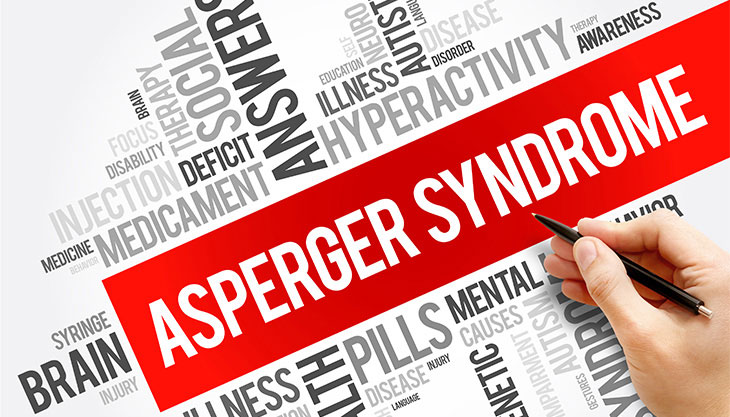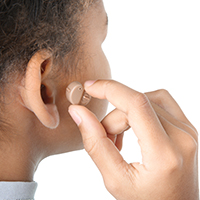Other Conditions Related to Asperger Syndrome?

It’s very common for other conditions to be diagnosed alongside Asperger syndrome or autism. For this reason, it’s vital that we work with the needs arising from a person’s autism separately from their other needs, while offering support in a way that meets all of their needs.
Attention Deficit/Hyperactive Disorder (ADHD)
Three main kinds of problems are common in people with ADHD:
- Hyperactivity (overactive behaviours like fidgeting and constantly moving)
- Reduced concentration
- Impulse behaviour
Hearing Loss
 In their first few weeks, your newborn baby should be offered a hearing screening under the NHS. Language development and good communication are far more likely to be successfully developed if a child with hearing impairment is diagnosed early.
In their first few weeks, your newborn baby should be offered a hearing screening under the NHS. Language development and good communication are far more likely to be successfully developed if a child with hearing impairment is diagnosed early.
Sensory processing difficulties are common in people with Asperger syndrome and autism. It may be a good idea to arrange a hearing test through your GP if you or the person you care for or support is sensitive to noise.
No one knows the best approach for working with someone who has Asperger syndrome and hearing loss yet as this has not been agreed on by professionals. As they grow up, however, many professionals have found that a child who is taught sign language at an early stage will find learning and communication more manageable. Makaton, visual support, reference objects and British Sign Language (BSL) are just a few communication approaches that might come in handy.
Charities like Action on Hearing Loss have lots of useful information about hearing loss, impairment and deafness and are well worth checking out.
Epilepsy and Seizures
Seizures will develop in around 25% of children with Asperger syndrome or other Autism Spectrum Disorders. These can start as late as adolescence, but can often begin in early childhood. These seizures are caused by abnormal electrical activity in the brain. Staring spells or temporary periods of body convulsion, involuntary movements and unconsciousness may occur. High fevers or a lack of sleep may contribute to the development of these seizures.
Down’s Syndrome
This is a lifelong condition that can cause delays in development and learning. Children with Down’s syndrome are able to walk, talk and use the toilet, but are likely to reach this type of developmental milestone a little later than their peers without Down’s syndrome. This is because their cells contain a duplicate of chromosome 21. Just like Asperger syndrome, it cannot be cured, but it’s still more than possible for someone with the condition to have an independent and fulfilling future.
Soon after the child’s birth, most parents will find out about their baby’s condition fairly quickly.
Some degree of learning disability will be experienced by everyone with Down’s syndrome. It’s common for people with Down’s syndrome to learn more easily if the main words are signed as well as spoken, and like many people on the autism spectrum, they may find visual learning easier.
Asperger syndrome and Down’s syndrome are diagnosed together in some cases. The Down’s Syndrome Association has some great advice for this situation.
Sleep Problems
Sleep problems are common in children with Asperger syndrome, who may have problems falling asleep or staying asleep. To make matters worse, the parents of children with Asperger syndrome and sleep problems often report poorer overall health and greater family stress. This can lead to poor behaviour, a reduced attention span, and reduce their ability to function.
It’s possible for these problems to persist into adulthood, or at least adolescence.
Some people find they are able to sleep better when they use medications like melatonin, the hormone that regulates the body’s sleep-wake cycle. Melatonin can have unwanted side effects just like any other medication. Before giving your child melatonin, you should always talk to your child’s doctor about the possible risks and benefits. Creating a bedtime routine or following a sleep schedule may be helpful, as sleep problems can often be treated with changes in behaviour.
Family stress can be greatly relieved by treating sleep problems in children with Asperger syndrome, and your child’s functioning and behaviour should improve too.
Dyslexia
Mainly affecting the development of literacy- and language-related skills, dyslexia is a lifelong specific learning difficulty. Sequencing, remembering things, time perception, organisation and speed of processing can all become problematic, as dyslexia affects the way information is processed, stored and received.
OCD (Obsessive Compulsive Disorder)
Many children with Asperger syndrome also struggle with a co-occurring diagnosis of obsessive compulsive disorder (OCD). Once the clinician can distinguish between behaviours related to OCD and those belonging to Asperger’s, he or she can prescribe the most appropriate treatment(s). Both disorders are characterised by a “need for sameness” to help the individuals feel like they have control over their environment and ensure predictability.
Behavioural rituals (compulsions) and persistent thoughts (obsessions) are often seen in children and teens diagnosed with Asperger syndrome and OCD. OCD is marked by increasing anxiety around obsessive thoughts and whether or not the compulsion is being performed correctly.
The reasons for the behaviours associated with OCD and Asperger syndrome are often very different, although the two conditions can sometimes be difficult to tell apart. Unlike the anxiety-based compulsions of OCD, people with Asperger syndrome tend to engage in repetitive or obsessive routines because they find them familiar or relaxing.
For more information about Asperger syndrome, check out The Essential Guide to Asperger’s Syndrome from Need2Know, which deals with how to develop communication, how to deal with obsessive behaviour and how to get further help and support. Need2Know’s Essential Guide to Autism, which provides practical advice from professionals and other parents of autistic children, may also be of interest.



